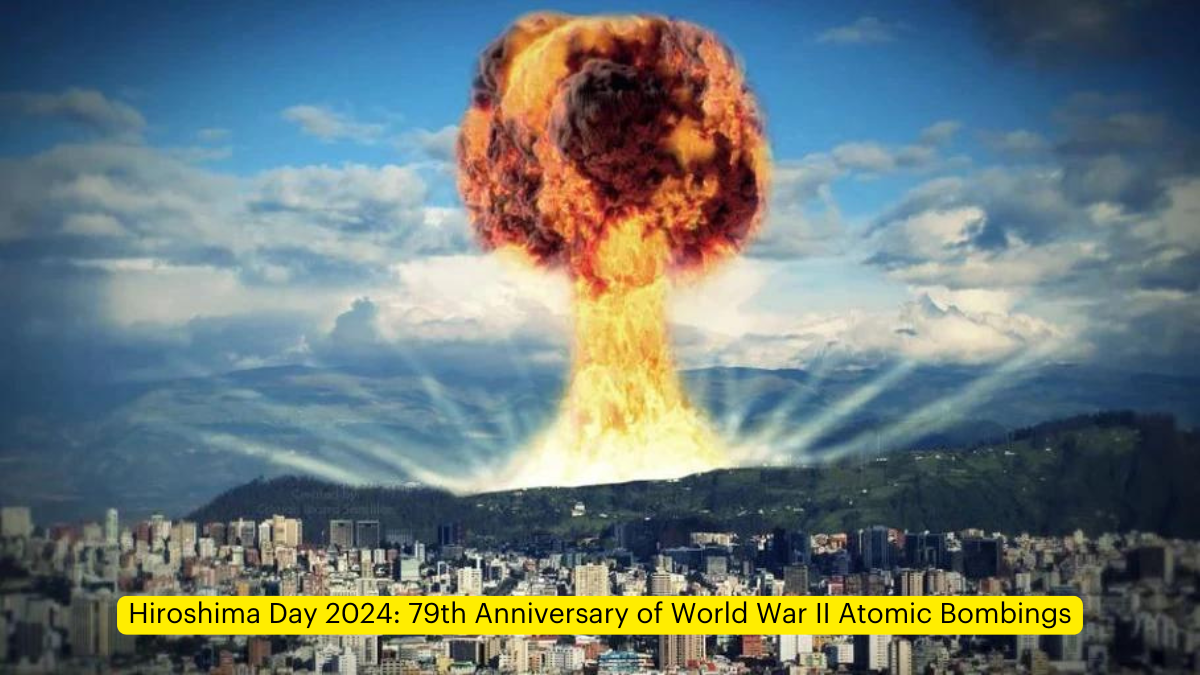Hiroshima Day, observed annually on August 6th, stands as a solemn reminder of one of the most devastating events in human history. This year marks the 79th anniversary of the atomic bombing of Hiroshima during World War II. The city of Hiroshima, once reduced to ashes, now stands as a powerful symbol of peace, resilience, and the enduring human spirit.
Historical Background
The Manhattan Project and the Creation of the Atomic Bomb
In the midst of World War II, the United States embarked on a secret initiative known as the Manhattan Project. This ambitious endeavor aimed to develop the world’s first nuclear weapons. The project culminated in the creation of two atomic bombs, codenamed “Little Boy” and “Fat Man.”
The Fateful Day: August 6, 1945
On the morning of August 6, 1945, an American B-29 bomber named Enola Gay took off from Tinian Island in the Pacific. Its mission was to drop the first atomic bomb ever used in warfare on the Japanese city of Hiroshima. At 8:15 AM local time, “Little Boy” was released over the city.
Immediate Impact and Aftermath
The detonation of the atomic bomb resulted in unprecedented destruction. An estimated 39% of Hiroshima’s population was instantly killed. The death toll in the immediate aftermath ranged from 90,000 to 140,000 people, with the majority being civilians. The blast, heat, and radiation caused widespread devastation, leveling buildings and leaving lasting scars on both the landscape and the survivors.
Long-Term Consequences
Health Effects
The bombing’s impact extended far beyond the initial destruction. Survivors, known as Hibakusha, faced numerous health challenges in the years and decades that followed. These included:
- Increased rates of cancer, particularly leukemia
- Birth defects and genetic disorders in subsequent generations
- Long-term psychological trauma
Environmental Impact
The bombing also had severe environmental consequences:
- Contamination of soil and water sources
- Destruction of plant and animal life
- Long-lasting radioactive fallout
Significance of Hiroshima Day
Remembrance and Education
Hiroshima Day serves as a crucial opportunity for remembrance and education. It allows people around the world to:
- Honor the victims and survivors of the atomic bombing
- Learn about the historical context and consequences of nuclear warfare
- Reflect on the importance of peace and diplomacy in international relations
Advocacy for Nuclear Disarmament
The observance of Hiroshima Day has become intrinsically linked with the global movement for nuclear disarmament. It serves as a platform to:
- Raise awareness about the continued existence of nuclear weapons
- Advocate for the reduction and eventual elimination of nuclear arsenals
- Promote international cooperation in preventing nuclear proliferation
Observance and Commemoration
Hiroshima Peace Memorial Ceremony
The central event of Hiroshima Day is the Peace Memorial Ceremony held in Hiroshima’s Peace Memorial Park. This solemn gathering includes:
- Speeches by local officials, survivors, and international dignitaries
- A minute of silence at 8:15 AM, the exact time of the bombing
- The release of doves as a symbol of peace
- The ringing of the Peace Bell
Hiroshima Peace Memorial Museum
The Hiroshima Peace Memorial Museum plays a crucial role in preserving the memory of the atomic bombing and educating visitors about its impact. The museum:
- Houses artifacts and testimonies from the bombing
- Provides historical context and scientific explanations
- Offers a sobering look at the human cost of nuclear warfare
Lantern Floating Ceremony
As evening falls on August 6th, thousands of paper lanterns are set afloat on the Motoyasu River. This Lantern Floating Ceremony serves as:
- A tribute to the victims of the bombing
- A symbol of hope for a peaceful future
- A visual representation of the community’s collective memory and resilience
Global Impact and Legacy
International Day Against Nuclear Tests
Inspired in part by the events of Hiroshima, the United Nations established the International Day Against Nuclear Tests, observed on August 29th. This day further emphasizes the global commitment to ending nuclear testing and promoting disarmament.
Hibakusha Testimonies
The survivors of Hiroshima and Nagasaki, known as Hibakusha, have played a crucial role in:
- Sharing firsthand accounts of the bombings and their aftermath
- Advocating for peace and nuclear disarmament
- Ensuring that the memory of the atomic bombings is preserved for future generations




 World Peace and Understanding Day 2026: ...
World Peace and Understanding Day 2026: ...
 International Mother Language Day 2026: ...
International Mother Language Day 2026: ...
 Arunachal Pradesh Foundation Day 2026: P...
Arunachal Pradesh Foundation Day 2026: P...








